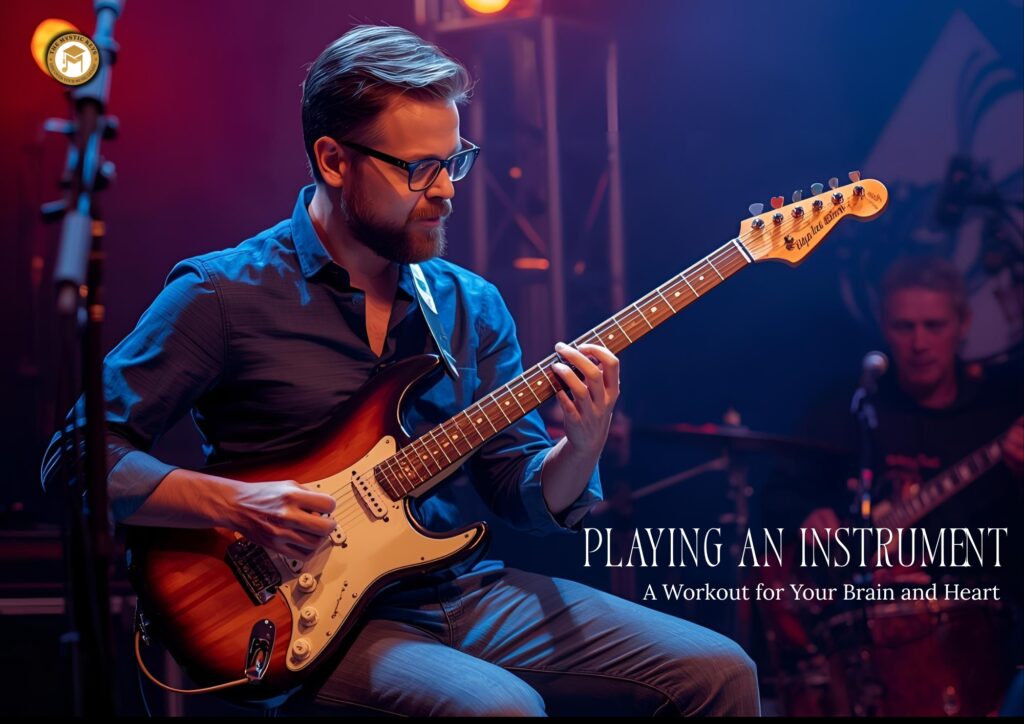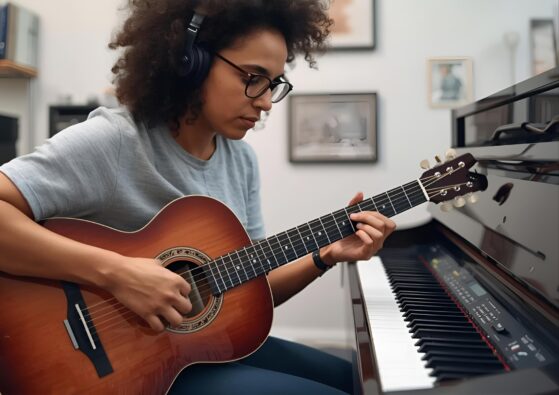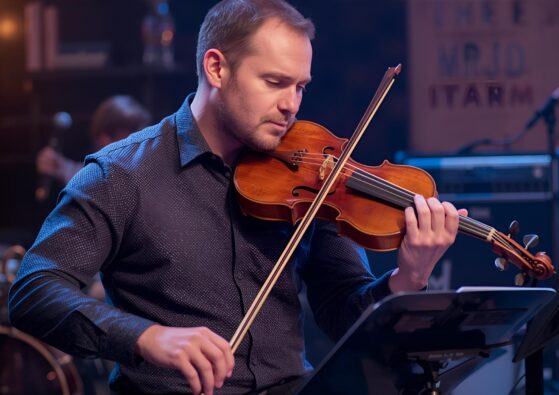
Playing an Instrument | A Workout for Your Brain and Heart
Playing an Instrument | A Workout for Your Brain and Heart
When you think of a workout, the first images that often come to mind are treadmills, dumbbells, or yoga mats. These are the classic symbols of physical fitness. But here’s something you may not have considered: playing a musical instrument is also a workout. It may not leave you sweating in the same way, but it exercises your brain, nurtures your emotions, and even benefits your heart.
Unlike traditional exercise, this form of workout is unique—it blends physical coordination, mental agility, and emotional expression all at once. Every time you pick up an instrument, you’re engaging your body, mind, and spirit in harmony.
In this blog, we’ll explore why playing an instrument is much more than making music. It’s a holistic path to cultivating a healthier body, a sharper mind, and a happier you.

Playing an Instrument Boosts Cognitive Fitness
Playing an instrument is one of the most comprehensive exercises for the brain. It challenges multiple cognitive domains simultaneously:
Memory Enhancement: Musicians train their short-term and long-term memory by memorizing scales, chords, lyrics, and entire compositions. This constant mental workout strengthens recall abilities and enhances overall memory performance.
Improved Multitasking: Instruments like the piano or drums demand that your brain processes multiple tasks at once: reading sheet music, controlling timing, coordinating hands and feet, and maintaining rhythm. This enhances executive function and multitasking skills.
Problem-Solving Skills: Musical practice encourages analytical thinking. Interpreting complex compositions, improvising, and adjusting musical expression fosters creativity and critical thinking.
Neuroplasticity: Learning new musical pieces forms new neural pathways, boosting brain adaptability and cognitive resilience. This flexibility can positively impact learning in other areas, from languages to logic-based tasks.
Delayed Cognitive Decline: Studies have shown that musicians often maintain sharper cognitive functions as they age, with a reduced risk of Alzheimer’s and other neurodegenerative conditions.

Emotional and Psychological Benefits
Music is inherently emotional, and playing an instrument becomes a powerful channel for those emotions. Instead of letting stress or frustration build up, you can transform those feelings into sound, giving them structure and meaning. This process not only helps release tension but also creates a sense of relief and clarity. Over time, playing music shifts from being just an activity to becoming a form of emotional therapy—one that allows you to express joy, sadness, or even complex emotions in a constructive and deeply personal way.
Stress Reduction: Playing an instrument lowers cortisol levels, promoting relaxation and reducing anxiety. The rhythmic nature of music can have a calming, almost meditative effect on the mind.
Mood Boost: Creating music triggers dopamine release, lifting spirits and enhancing motivation. This natural “feel-good” effect makes musical practice therapeutic.
Emotional Expression: Instruments give a voice to emotions that are hard to articulate verbally. From joy to sorrow, each note becomes an outlet for personal expression.
Confidence Building: Mastering new techniques or performing in front of others fosters self-confidence and a sense of accomplishment.
Social Connection: Playing in ensembles or bands strengthens emotional intelligence, teaching empathy, teamwork, and communication skills.

Playing an Instrument Offers Physical Benefits
While it may not look like traditional exercise, playing an instrument engages your body in surprising ways:
Cardiovascular Benefits: Percussion instruments and even high-energy piano pieces can elevate heart rate, providing a mild aerobic workout.
Strengthens Fine Motor Skills: Instruments demand precise hand, finger, and foot movements, improving dexterity, coordination, and overall motor control.
Breath Control: Wind and brass instruments require controlled breathing, enhancing lung capacity and oxygen intake while promoting calm and focus.
Posture and Core Engagement: Maintaining proper posture during practice strengthens back and core muscles. Instruments like the cello, violin, or piano naturally encourage body alignment.
Coordination and Reflexes: Drumming, guitar strumming, and piano playing involve synchronized movements, training the brain-muscle connection and improving reaction times.

Playing an Instrument Builds Mental Endurance and Focus
Learning an instrument isn’t a quick sprint; it’s a marathon—one that gradually shapes patience, focus, and discipline. Each practice session builds on the last, teaching you to stay consistent even when progress feels slow. Over time, those small daily efforts translate into big achievements, not only in music but also in other areas of life. The process itself becomes just as valuable as the outcome, training your mind to handle challenges with resilience and determination.
Concentration: Practicing music demands full attention, improving focus and helping develop mindfulness.
Resilience: Mastering challenging pieces teaches perseverance and the ability to embrace mistakes as part of the learning process.
Time Management: Regular practice routines cultivate self-discipline and organizational skills.
Cognitive Flexibility: Switching between musical styles, tempos, and techniques keeps the brain adaptable and quick-thinking.

Music as Mind-Body Integration
Unlike most physical exercises, playing an instrument combines mental, emotional, and physical effort:
Mindful Awareness: Musicians learn to stay present, improving mindfulness and reducing mental clutter.
Emotional-Physical Synchrony: Coordinating emotion, rhythm, and movement creates harmony between mind and body.
Holistic Engagement: Each practice session stimulates multiple systems—neurological, cardiovascular, muscular, and emotional—providing a comprehensive mind-body workout.

Additional Health Benefits of Playing an Instrument
Playing an instrument offers even more subtle yet impactful health benefits:
Pain Management: Music therapy has been shown to help reduce perception of chronic pain by redirecting attention and triggering relaxation responses.
Better Sleep: Engaging in relaxing musical practice can regulate sleep patterns and improve sleep quality.
Brain Hemispheric Balance: Instruments like the piano require simultaneous use of both hands, stimulating communication between brain hemispheres and improving creativity and logical thinking.
Enhanced Sensory Processing: Musicians often develop sharper auditory discrimination, better spatial reasoning, and improved hand-eye coordination.

Tips to Maximize the Benefits of Playing an Instrument
To truly harness the mind and heart benefits of playing an instrument, consider these practical approaches:
Consistency is Key: Regular practice, even just 20–30 minutes daily, can have cumulative benefits for both mind and body.
Vary Your Routine: Alternate between scales, sight-reading, improvisation, and performance exercises to engage different brain areas.
Practice Mindfully: Pay attention to breath, posture, and emotional expression to maximize physical and mental benefits.
Perform and Collaborate: Playing with others increases social, emotional, and cognitive engagement.
Set Goals: Track progress and celebrate milestones to boost motivation and emotional satisfaction.

Conclusion | Music as a Complete Workout
Playing a musical instrument is more than just a hobby or a creative outlet—it’s a full-spectrum workout for the brain, heart, and body. Each practice session becomes a unique blend of mental focus, emotional release, and physical engagement. By committing to consistent practice, you not only strengthen cognitive abilities but also enhance emotional well-being, improve physical coordination, and nurture a resilient mind.
In today’s fast-paced world, where stress, sedentary habits, and mental fatigue are increasingly common, the role of music goes far beyond entertainment. It becomes a powerful tool for holistic health—calming the mind, uplifting the spirit, and energizing the body all at once. Whether you are just beginning your musical journey or have been playing for years, every note you play contributes to a healthier mind, a stronger heart, and a more joyful life.
That’s why at The Mystic Keys, we believe learning music is an investment not just in skill, but in overall well-being. Our expert instructors guide students step by step, helping them experience both the joy of playing and the health benefits it brings.
So, when you pick up that guitar, sit at the piano, or hold that violin, remember—you are not only creating music but also nurturing your mind, heart, and body. With The Mystic Keys by your side, each note becomes a step toward harmony, health, and happiness.
For more information and exciting resources about learning music, visit our website at The Mystic Keys. For more music content and exciting offers follow us on
Facebook, Instagram, YouTube, LinkedIn, Twitter, Pinterest, and Threads.

